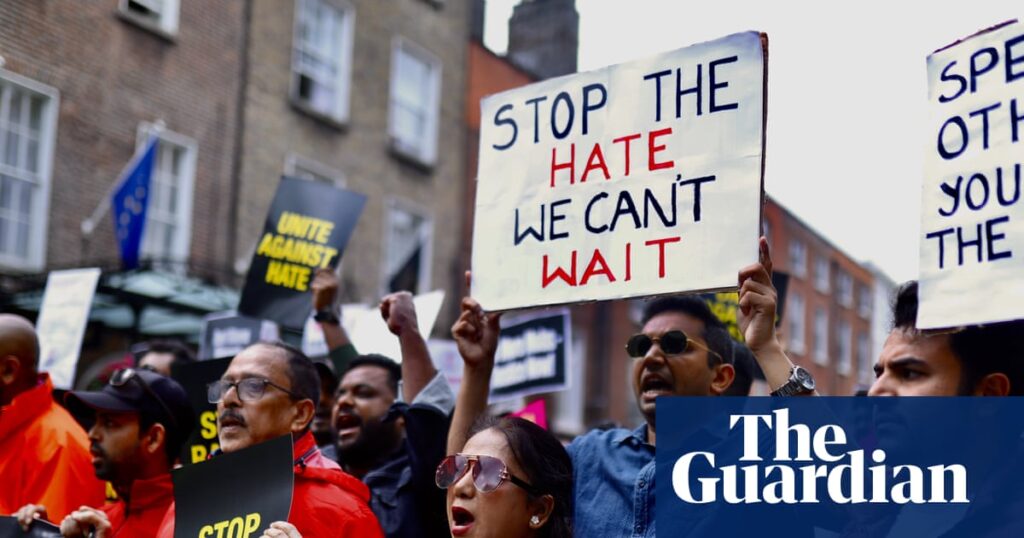In the west Dublin suburb of Tallaght, a group of teenagers accosted, beat and partially stripped an Indian man, who was then filmed staggering and bleeding. Days later a gang attacked another Indian man in the nearby suburb of Clondalkin, hitting him in the face, chest, back and legs, leaving him with a fracture, gashes and multiple bruises.
Days later again, two male passengers turned on an Indian taxi driver in the north Dublin suburb of Ballymun, striking him across the face with a bottle and shouting: “Go back to your country.”
Days later, boys in a County Waterford housing estate allegedly punched a six-year-old girl in the face, hit her in the genital area with a bicycle and told her: “Go back to India.”
These are just some of a spate of incidents in recent weeks that have sown alarm and bewilderment among the Indian community, and other immigrants, in Ireland. In each case police are investigating but no charges have yet been brought.
Indians held a silent protest outside the justice department and the Indian embassy in Dublin has urged its citizens to take security precautions and avoid deserted areas. Media in India have given prominent coverage to the assaults, a jolt to those from the country who had long considered Ireland a safe, welcoming destination.
“A fellow on a motorbike stopped and hit me in the face when I was stopped in traffic,” said a Dublin-based taxi driver from the state of Punjab, who declined to be named. “Why is this happening?”
Each new incident makes the question more urgent. Since the 1990s, immigration has transformed a once mono-ethnic country into one where a fifth of the population was born overseas. In recent years, anger over a lack of affordable homes has fuelled resentment towards immigrants and asylum seekers and led to protests, some violent. Thugs posted videos of attacks on tents with refugees from Africa and the Middle East.
Since June there has been a spate of brutal assaults on people from south Asia, many of whom have lived in Ireland for years and are taxi drivers, tech workers or medical professionals.
“We are accustomed to micro-aggressions,” said Fahmeda Naheed, a poet and human rights activist from Pakistan who has lived in Cork for 13 years. “We are seeing more physical assaults. It is more forceful and aggressive than in the past. It has coincided with the housing shortage and antisocial behaviour of the youth.”
Naheed called for improved policing and procedures to encourage victims to come forward, counselling, anti-racism education and hate crime legislation.
The far right remains a marginal political force but videos of anti-immigrant rallies are widely shared. A recent one shows a man in a playground telling a small crowd with Irish tricolours that immigrants are arriving who are not fit to work yet are buying property. “They’re never going to integrate either. Islam should never be allowed into a Christian country,” he said, prompting cheers.
Amal Women Ireland, a group that provides support to Muslim women, expressed alarm after what it called a “violent, racially motivated” assault on a colleague at a Dublin bus stop on 30 June.
An open letter posted on Reddit purportedly from an Indian nurse says the author and dozens of colleagues are thinking of quitting Ireland because of abuse and fear. It cites an incident in which Irish teenagers bullied and mocked an eight-year-old Indian girl. “What kind of place is this becoming? We came to Ireland to save lives and now we’re scared to walk home after a shift,” it says.
The letter is anonymous and the Guardian has not been able to verify the authenticity, but it has gone viral and amplified concern at racism and xenophobia.
“I’m seeing a side of us that I don’t like,” Jennifer Whitmore, a legislator with the Social Democrats, posted this week on social media. “I think that some people’s fear of being left behind is being hijacked by a small minority of toxic individuals whose only objective is chaos, hatred and a divided society.”

